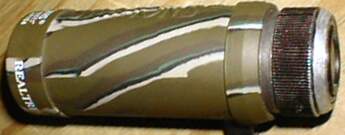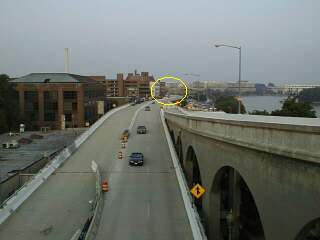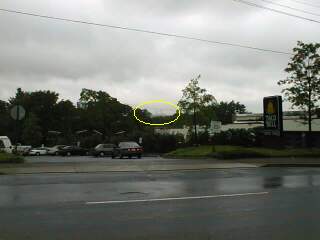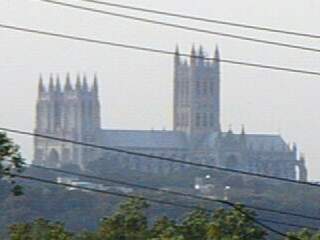The Poor Man's Digital Camera Zoom Lens
 visitors since May 9, 1998
visitors since May 9, 1998 visitors since May 9, 1998
visitors since May 9, 1998Update: June 17, 1999. I wrote this essay in May 1998, and since then I've refined the technique and changed cameras. Using a decent monocular, a camera with an optical zoom, and a specially made adpater to fit the monocular to the camera the results are excellent. I don't suppose too many people have an Epson 600 camera these days, but the essay might be interesting to some nonetheless!
Bought a digital camera without a zoom lens? Or got one with a disappointing digital zoom? Not all is lost. With a little patience, ingenuity and willingness to compromise you might be able to assemble something that will allow you to take decent zoom shots. You'll need to get a monocular -- a "one-eyed" binocular. (Walmart sells a Simmons 8x21 monocular for about $15.) All you have to do is focus the monocular on your subject, hold it up to the lens of the digital camera (here's how I do it), stay very steady and take the picture. Here are some instructions on creating an adapter to mount the monocular on the camera.
How well this works will depend on the construction of your camera. Some people have had remarkable results using the Konica Q-mini ditigal camera. With the Epson PhotoPC 600 the results aren't initially as good, but can be significantly improved. One problem is that the Epson's design makes it impossible to place the monocular particularly close to the camera lens. As a result, the pictures show significant vignetting -- i.e. they look like they were taken through a circular window (which, of course, they were!) One way of avoiding this vignetting is to use the camera's digital zoom in conjunction with the monocular. A zoom setting of 2.0 eliminates most of the "black space" in the image, although the camera tends to over-expose when taking a picture through the monocular, because all the dark space in the image "fools" the camera's light meter.
 But, with a little modification you can solve this problem and get much, much better results: Remove the rubber casing from the top (the "eye end") of the monocular and sand (or file) the metal band around the eyepiece. (The picture above shows the monocular with the casing removed and its top sanded down.) Trimming a few millimeters off the metal allows you to place the eyepiece of the monocular partly inside the camera's shutter cover, which significantly reduces vignetting. Altered in this way, the camera will take a picture at a zoom setting of 1.3 without vignetting. (Don't be afraid to keep trimming the top. It took me 6 months before I realized that you can shave off enough metal to remove this much vignetting.)
But, with a little modification you can solve this problem and get much, much better results: Remove the rubber casing from the top (the "eye end") of the monocular and sand (or file) the metal band around the eyepiece. (The picture above shows the monocular with the casing removed and its top sanded down.) Trimming a few millimeters off the metal allows you to place the eyepiece of the monocular partly inside the camera's shutter cover, which significantly reduces vignetting. Altered in this way, the camera will take a picture at a zoom setting of 1.3 without vignetting. (Don't be afraid to keep trimming the top. It took me 6 months before I realized that you can shave off enough metal to remove this much vignetting.)
I've found that the best results come without using the digital zoom, however. The Epson's high quality mode produces images that are 1024x768 pixels. Even with the vignetting introduced by the monocular, I can always crop an image that is at least 800x600 pixels in size. (Using the digital zoom forces the camera to produce 640x480 images.) Watch out Mavica owners!!
If you need even more zoom, there is a relatively inexpensive way of nearly doubling the power of the monocular super-zoom. Here are the details.

No monocular, no digital zoom
800x600 pixels cropped from 1024x768 image, resized. Click to see full-size

No monocular, no digital zoom
With monocular, 1.6x zoom. Click to see 640x480 original

No monocular, no digital zoom
With monocular, 1.6x zoom, cropped

No monocular, no digital zoom
With monocular, 1.6x zoom, cropped

No monocular, no digital zoom
With monocular, 1.6x zoom, cropped

No monocular, no digital zoom
With monocular, 2.0x zoom, cropped

No monocular, no digital zoom
With monocular, 1.6x zoom, cropped

No monocular, no digital zoom
With monocular, 1.6x zoom, cropped